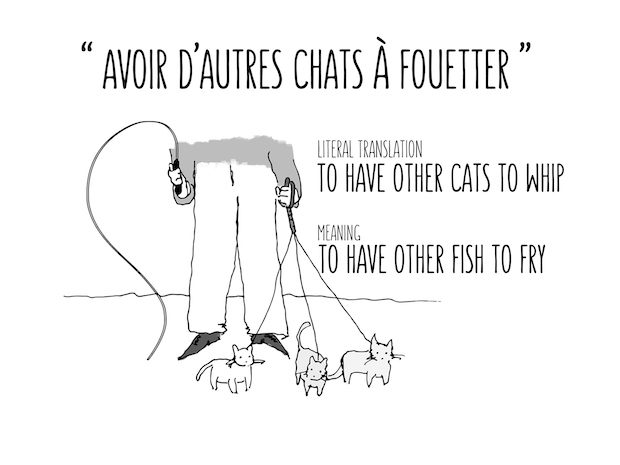Idioms (les idiotismes, m.) are expressions that don’t necessarily make sense literally, but have a well known meaning to native speakers. In order to be able to understand a language’s idioms, therefore, you can’t just know the exact definition of a word but you must also understand the social and cultural meaning behind that word.
It is also nearly impossible to perfectly translate.

Here are some common idiotismes that you may come across in French:
Appeler un chat un chat
Literal meaning: “To call a cat a cat”
Actual meaning: In English, we would use another idiomatic expression “calling a spade a spade.” This means that you call something out for what you see it as.
Example: “Je l’ai vu! Il faut appeler un chat un chat.” (I saw it! I’m just telling it as it is.)
Avoir la gueule de bois
Literal meaning: “To have a mouth of wood”
Actual meaning: This just means to have a hangover.
Example: Je suis sortie hier soir et je me suis levée ce matin avec une gueule de bois grave. (I went out last night and I woke up this morning with a serious hangover.)
Être à l’ouest
Literal meaning: “To be in the west”
Actual meaning: To be out of it or to be crazy/out of touch with reality.
Example: Il est complètement à l’ouest, ce mec! (This guy is totally out of it!)
Avoir un poil dans la main
Literal meaning: “To have a hair in the hand”
Actual meaning: To be very lazy, in fact so lazy that they watched a hair grow in the palm of their hand!
Example: Il dort tous les jours jusqu’à midi. Il a vraiment un poil dans la main. (He sleeps every day until noon. He’s really lazy!)
Donner un coup de main
Literal meaning: “To give a a hit of the hand”
Actual meaning: To give a helping hand. This idiom can be especially confusing because, to someone who is not native, it can sound almost threatening, although all it means is to help someone out!
Example: Elle est tellement gentille. Elle me donne toujours un coup de main sans que je demande. (She is so nice. She always helps me out even without asking).
Bonne Chance!


Blog submitted by: Alex at The French Property Network - Cle France.
This blog was originally posted on The French Language Blog pages.